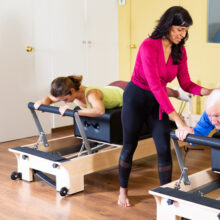Beat the Blues, Axe Anxiety & Boost Morale with Exercise
- Published: Tuesday, March 13th 2012
- in Fitness
By Stacey Colino for iVillage.com
Next time you’re feeling blue or stressed or compelled to eat, lace up some walking shoes and head to the gym, the trail or the weight room. It may beat sitting on a therapist’s couch, and you get a physical workout, to boot. “People need to become more aware of the benefits of exercise for mental health in both the short term and the long run,” says Ana M. Abrantes, Ph.D., assistant professor (research) at the Alpert Medical School of Brown University in Providence, R.I. “Being physically active isn’t only important for physical health or weight loss.” Here are ways exercise can alleviate mental health problems.
 Aerobicize Your Depression
Aerobicize Your Depression
Sweat your way to happiness. Research shows that regular aerobic exercise works just as well as an antidepressant in treating major depression, and may even be superior at reducing the risk of a recurrence of depressive symptoms, according to a recent study at the Duke University Medical Center in Durham, N.C. At this point, it isn’t known whether this is because exercise stimulates the opioid system (including the release of mood-boosting endorphins), distracts you from unpleasant thoughts or provides a low-pressure time to solve difficult problems, notes James Blumenthal, Ph.D., a professor of medical psychology at Duke. But the benefits of exercise in improving depression continue to stack up.
 Walk Briskly Toward a Healthy Libido
Walk Briskly Toward a Healthy Libido
How you move outside the bed is just as important as what you do between the sheets. Research at the University of Texas at Austin suggests that moderate exercise (such as walking briskly or jogging on a treadmill) boosts sexual arousal in women thanks to a combination of changes in levels of brain chemicals and sympathetic nervous system activity, as well as improved mood. So get moving — with or without your honey!
 Race from Panic
Race from Panic
The increase in breathing and heart rate that occurs with moderate to vigorous exercise may feel alarmingly familiar to those who are prone to panic attacks, but regular physical activity has been found to have a calming effect in people who suffer from panic disorder. Moreover, research from the University of Goettingen in Germany found that people with panic disorder experienced significant improvements in symptoms after doing daily aerobic exercise for three weeks, especially if they also took an antidepressant. Since sensitivity to anxious sensations contributes to panic disorder, Smits notes, “Exercise that can yield improvements in anxiety sensitivity may be effective for treating panic.”
 Kick(box) a Smoking Habit
Kick(box) a Smoking Habit
Okay, you don’t really need to do kickboxing, but research at Brown University suggests that when healthy women smokers used the nicotine patch and did three sessions of moderate-intensity aerobic exercise per week, the combination helped increase their energy, decrease their fatigue and ease their cigarette cravings during the eight-week program. Since the benefits dissipated somewhat week after week, the researchers concluded that aerobic exercise can help you quit smoking, but only if you do it frequently and consistently over time.
For more exercise tricks to elevate your mood and to view the full slideshow, go to iVillage.com
iVillage.com is a Wellness Week 2012 partner! Wellness Week, March 19-25, is your chance to look and feel your best with exclusive spa treatments, private training and more, all at $50 prices or 50% discounts. Learn more at Wellness Week 2012.


